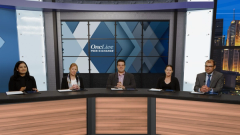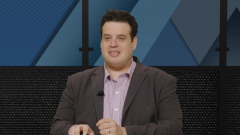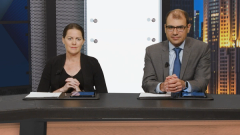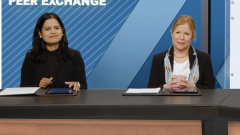
What is the Role of Transplant in Newly Diagnosed Multiple Myeloma?
Expert panelists reflect on the continuing role of stem cell transplant in patients with newly diagnosed multiple myeloma.
Episodes in this series

Transcript:
Joshua Richter, MD: Hello, and welcome to this OncLive Peer Exchange® titled, “The Evolving Treatment Paradigm in Multiple Myeloma, Recent Updates.” I'm Dr Richter, associate professor of medicine at the Icahn School of Medicine at Mount Sinai, and the director of myeloma services at the Blavatnik Family-Chelsea Medical Center at Mount Sinai. I'm joined today by a panel of experts in multiple myeloma. I would like to welcome my esteemed fellow panelists and invite them to introduce themselves.
Natalie S. Callander, MD: Hi, I'm Natalie Callander from the University of Wisconsin Carbon Cancer Center.
Susan Bal, MD: Hi, I'm Susan Bal. I'm an assistant professor of medicine at the University of Alabama at Birmingham, O'Neill Comprehensive Cancer Center.
Elizabeth O’Donnell, MD: Hi, I'm Betsy O'Donnell from the Dana-Farber Cancer Institute in Boston.
Alfred L. Garfall, MD: Hello, I'm Alfred Garfall from the Abramson Cancer Center at the University of Pennsylvania.
Joshua Richter, MD: Welcome everyone and thank you for joining me. Today we're going to discuss recent updates in the treatment of multiple myeloma. We'll discuss the data in context of guidelines, the treatment landscape, and its impact on clinical practice. Let's get started.I'd like to ask the panel their thoughts about how transplant-eligible, newly diagnosed myeloma was traditionally treated and how this landscape has evolved over time. Anyone with any thoughts?
Natalie S. Callander, MD: There's a role for autologous stem cell transplant right now. It certainly is associated with the longest PFS [progression-free survival] DETERMINATION (NCT01208662). There is nothing else out there that has given a PFS that long. And particularly in standard-risk patients, who it was 81 months, if I've got that correct. And I feel confident about recommending that to patients. And particularly, we also would agree with our [patients with] high-risk myeloma that that's an option that we are wanting them to consider.
Joshua Richter, MD: You're quoting DETERMINATION, which is one of the main state trials that got us here. Couldn't agree more. And I know through some of your work, I'd have to ask because DETERMINATION gave VRD [velcade/revlimid/dexamethasone]. Are you giving quads to everyone on their way to transplant?
Natalie S. Callander, MD: I am not.
Joshua Richter, MD: OK.
Natalie S. Callander, MD: And I will tell you why. We were a big accrue to the ENDURANCE trial (NCT01863550), which was a transplant deferred trial for standard-risk patients. And I feel comfortable right now, I suspect there's going to be an update coming next year, between VRD and KRD [kyprolis/revlimid/dexamethasone] induction, but high response rates in the mid 80s. And what we've also done in that particular trial is patients have been able to go on to autologous stem cell transplant and be salvage successfully, at least in my experience. So, no. We are certainly giving high-risk patients—we could also quibble here how we want to define high-risk—but those patients, we are giving a quad to.
Alfred L. Garfall, MD: And I agree with you on that, Natalie. Many patients do well with VRD. And there's always the potential to convert a triplet to a quad if you're not seeing the response you like in the first couple cycles. It's very clear that it's safe to give quads and that's reassuring data for the patients that we think need it and you're worried about disease control in those early months. We haven't adopted it universally for everybody at this point in the absence of long-term overall survival data that tells us that we need to give quads to everybody for the best long-term outcomes.
Susan Bal, MD: As a group, we've been early adopters of anti-CD38 monoclonal antibody-based therapy and upfront therapy both for the transplant-eligible and -ineligible patients. And routinely, we are incorporating a monoclonal antibody in our transplant-eligible patient and using it in a quadruplet setting, mostly because the benefit that high-risk patients achieve is certainly worthwhile, but we see a magnified benefit in the standard-risk patients who do…so remarkably well. And as long as the patient is eligible in terms of their biological, not just their chronological age, it's reasonable to offer it to everybody. But more importantly, transplant plays a great role in the high-risk patients. And we've seen that theme across multiple different studies is how transplant certainly benefits the high-risk patients regardless of how we define high-risk or the ultra–high risk.
Elizabeth O’Donnell, MD: But the flip side of this is, why are so many people not transplanting as well? And so, myeloma is a field that's divided in terms of when and how to use transplant currently. And so, with the addition of monoclonal antibodies to frontline therapy, we are seeing tremendous depth of response. And we know from determination and the IFM study that you're not necessarily seeing an overall survival benefit; you're certainly seeing the progression-free survival benefit. So, when you give patients the option, and we do have phase II studies that we've done in our center, patients often prefer the deferred approach. Everybody should be collected unequivocally, that's just money in the bank. But there are downsides of transplant too, and they're not perfect or right for everybody. And it's also about timing, life circumstances. So, there are a lot of factors, that go into my own decision making about whether I transplant someone upfront vs collect and defer.
Alfred L. Garfall, MD: And I want to second your point about the early collection because the broader oncology community might get the impression that there is some disagreement or lack of consensus about the need for frontline transplant. There is consensus that this needs to be preserved as an option for our younger patients. And that all the trials that have tested this deferred transplant approach, it does rely on collecting stem cells in the first line of therapy. And it is a somewhat nuanced discussion, with the patient that probably should happen at a transplant center with a physician that does transplants. And so, I would still want to encourage everyone, even if the patient is equivocal or not sure about transplant, to refer to the transplant center to have that conversation. And even if you decide to take a deferred transplant approach, consider the early stem cell collection before the patient has had too much therapy.
Natalie S. Callander, MD: But I would want to comment that there's a couple of publications. We did one maybe a decade ago, and there's been one you did recently, where people who have stem cells collected, often they're not getting used. That's a real issueand it's interesting in the DETERMINATION trial, it's 25% of people got the salvage auto. So, I sometimes feel people who are very emphatically anti-transplant don't take care of the patients who've had an auto transplant because I believe, yes, their quality of life is lower vs chemo for that first 3 months, but then they have great quality of life. They travel, they take their maintenance. And if we get to the point with SWOG 1803, when that gets read out, randomized study between lenalidomide, indefinitely if you're in an MRD [measurable residual disease] negative state vs 2 years or lenalidomide plus daratumumab, we're going to have a great new standard. And if you have an opportunity to take a person off treatment for a prolonged period of time, that's going to be a major benefit. And I think we would all agree that we've seen patients go through transplant, maybe who've been sent progressing and get into that good deep response, get into a CR [complete response]. And transplant really is a good steppingstone to do that.
Alfred L. Garfall, MD: While I agree that if you look at IFM09 and DFCI (NCT01191060) that the overall survival is comparable. Remember, those studies weren't powered for overall survival.
Natalie S. Callander, MD: Absolutely.
Joshua Richter, MD: And it’s still early when you think about the long survival that these patients have. It's too early to conclude that there is not going to be an overall survival difference emerge with more follow up, especially if patients in the deferred transplant arm aren’t getting the deferred transplant. And if you look at EMN02 (
Susan Bal, MD: And if you look at measurable residual disease or MRD, which is where the field is moving towards, we see that of course in the context of triplet therapies, that there is a depth improvement in the depth of response, including minimal residual disease negativity. But what was interesting to us is, going back to that MASTER (NCT04601116) data, if we look at patients who got a quadruplet, including a potent proteasome inhibitor, so we got daratumumab, carfilzomib, lenalidomide, and dexamethasone, and even in that context, after potent quadruplet therapy, we saw a decrease in MRD in 86% of the case patients. So, I thought that was encouraging data for transplant. Of course, that needs to be carefully weighed against the patient's preferences and all of the other things that we know of autologous stem cell transplant. But it was great to still see benefit of alkylators in that setting.
Transcript edited for clarity.










































